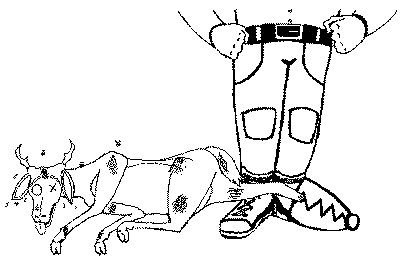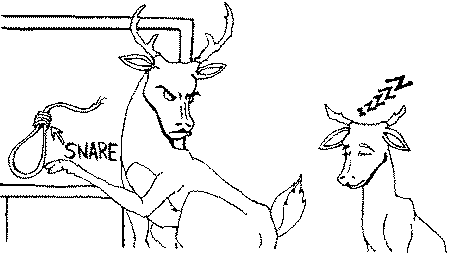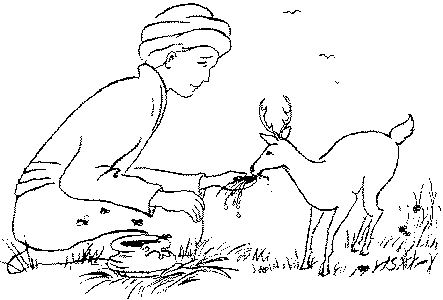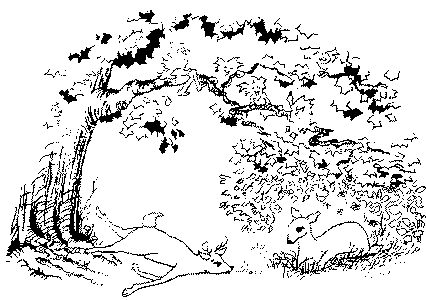2023年4月24日 星期一
2022年 恭迎 南無第三世多杰羌佛佛誕法會 (6/11/2022 - 6/12/2022)
16. THE FAWN WHO PLAYED DEAD [ATTENDANCE]
16. THE FAWN WHO PLAYED DEAD [ATTENDANCE]
Buddhist Tales for Young and Old, volume 1, Prince Goodspeaker, Stories 1-50

Once upon a time, there was a herd of forest deer. In this herd was a wise and respected teacher, cunning in the ways of deer. He taught the tricks and strategies of survival to the young fawns.
One day, his younger sister brought her son to him, to be taught what is so important for deer. She said, “Oh brother teacher, this is my son. Please teach him the tricks and strategies of deer." The teacher said to the fawn, “Very well, you can come at this time tomorrow for your first lesson."
The young deer came to the lessons as he was supposed to. When others cut classes to spend all day playing, he remained and paid attention to the good teacher. He was well-liked by the other young bucks and does, but he only played when his class work was complete. Being curious to learn, he was always on time for the lessons. He was also patient with the other students, knowing that some learn more quickly than others. He respected the teacher deer for his knowledge, and was grateful for his willingness to share it.
One day, the fawn stepped in a trap in the forest and was captured. He cried out in great pain. This frightened the other fawns, who ran back to the herd and told his mother. She was terrified, and ran to her brother the teacher. Trembling with fear, crying big tears, she said to him, “Oh my dear brother, have you heard the news that my son has been trapped by a hunter’s snare? How can I save my little child’s life? Did he study well in your presence?"
Her brother said, “My sister, don’t be afraid. I have no doubt he will be safe. He studied hard and always did his very best. He never missed a class and always paid attention. Therefore, there is no need to have doubt or pain in your heart. He will not be hurt by any human being. Don’t worry. I am confident he will return to you and make you happy again. He has learned all the tricks and strategies used by deer to cheat the hunters. So be patient. He will return!"
Meanwhile, the trapped fawn was thinking, “All my friends were afraid and ran away. There is no one to help me get out of this deadly trap. Now I must use the tricks and strategies I learned from the wise teacher who taught so well."
The deer strategy he decided to use was the one called, “playing dead." First, he used his hoofs to dig up the dirt and grass, to make it look like he had tried very hard to escape. Then he relieved his bowels and released his urine, because this is what happens when a deer is caught in a trap and dies in very great fear. Next, he covered his body with his own saliva.
Lying stretched out on his side, he held his body rigidly and stiffened his legs out straight. He turned up his eyes, and let his tongue hang out of the side of his mouth. He filled his lungs with air and puffed out his belly. Finally, with his head leaning on one side, he breathed through the nostril next to the ground, not through the upper one.
Lying motionless, he looked so much like a stiff corpse that flies flew around him, attracted by the awful smells. Crows stood nearby waiting to eat his flesh.
Before long it was early morning and the hunter came to inspect his traps. Finding the fawn who was playing dead, he slapped the puffed up belly and found it stiff. Seeing the flies and the mess he thought, “Ah, it has already started to stiffen. He must have been trapped much earlier this morning. No doubt the tender meat is already starting to spoil. I will skin and butcher the carcass right here, and carry the meat home."
Since he completely believed the deer was dead, he removed and cleaned the trap, and began spreading leaves to make a place to do the butchering. Realizing he was free, the fawn suddenly sprang to his feet. He ran like a little cloud blown by a swift wind, back to the comfort and safety of his mother. The whole herd celebrated his survival, thanks to learning so well from the wise teacher.
The moral is: Well-learned lessons bring great rewards.
16. The Fawn Who Played Dead [Attendance]
Link: https://hhdorjechangbuddhaiiiinfo.com/2022/02/15/16-the-fawn-who-played-dead-attendance/
INTERPRETER’S INTRODUCTION – BUDDHIST TALES FOR YOUNG AND OLD, VOLUME 1, STORIES 1-50
#Buddhisttalesforyoungandold #Buddhiststories #storiesforkids #moralstories #Buddha #Jatakastories #PansiyaPanasJataka
2023年4月18日 星期二
15. THE FAWN WHO PLAYED HOOKY [TRUANCY]
15. THE FAWN WHO PLAYED HOOKY [TRUANCY]
Buddhist Tales for Young and Old, volume 1, Prince Goodspeaker, Stories 1-50

Once upon a time, there was a herd of forest deer. In this herd was a wise and respected teacher, cunning in the ways of deer. He taught the tricks and strategies of survival to the young fawns.
One day, his younger sister brought her son to him, to be taught what is so important for deer. She said, “Oh brother teacher, this is my son. Please teach him the tricks and strategies of deer." The teacher said to the fawn, “Very well, you can come at this time tomorrow for your first lesson."
At first, the young deer came to the lessons as he was supposed to. But soon, he became more interested in playing with the other young bucks and does. He didn’t realize how dangerous it could be for a deer who learned nothing but deer games. So he started cutting classes. Soon he was playing hooky all the time.
Unfortunately, one day the fawn who played hooky stepped in a snare and was trapped. Since he was missing, his mother worried. She went to her brother the teacher, and asked him, “My dear brother, how is my son? Have you taught your nephew the tricks and strategies of deer?"
The teacher replied, “My dear sister, your son was disobedient and unteachable. Out of respect for you, I tried my best to teach him. But he did not want to learn the tricks and strategies of deer. He played hooky! How could I possibly teach him? You are obedient and faithful, but he is not. It is useless to try to teach him."
Later they heard the sad news. The stubborn fawn who played hooky had been trapped and killed by a hunter. He skinned him and took the meat home to his family.
The moral is: Nothing can be learned from a teacher, by one who misses the class.
15. The Fawn Who Played Hooky [Truancy]
Link: https://hhdorjechangbuddhaiiiinfo.com/2022/01/27/15-the-fawn-who-played-hooky-truancy/
INTERPRETER’S INTRODUCTION – BUDDHIST TALES FOR YOUNG AND OLD, VOLUME 1, STORIES 1-50
#Buddhisttalesforyoungandold #Buddhiststories #storiesforkids #moralstories #Buddha #Jatakastories #PansiyaPanasJataka
2023年4月12日 星期三
14. THE WIND-DEER AND THE HONEY-GRAS [THE CRAVING FOR TASTE]
14. THE WIND-DEER AND THE HONEY-GRAS [THE CRAVING FOR TASTE]
Buddhist Tales for Young and Old, volume 1, Prince Goodspeaker, Stories 1-50

Once upon a time, the King of Benares had a gardener who looked after his pleasure garden. Animals sometimes came into the garden from the nearby forest. The gardener complained about this to the king, who said, “If you see any strange animal, tell me at once."
One day, he saw a strange kind of deer at the far end of the garden. When he saw the man, he ran like the wind. That is why they are called ‘wind-deer’. They are a rare breed, that are extremely timid. They are very easily frightened by human beings.
The gardener told the king about the wind-deer. He asked the gardener if he could catch the rare animal. He replied, “My lord, if you give me some bee’s honey, I could even bring him into the palace!" So the king ordered that he be given as much bee’s honey as he wanted.
This particular wind-deer loved to eat the flowers and fruits in the king’s pleasure garden. The gardener let himself be seen by him little by little, so he would be less frightened. Then he began to smear honey on the grass where the wind-deer usually came to eat. Sure enough, the deer began eating the honey-smeared grass. Soon he developed a craving for the taste of this ‘honey-grass’. The craving made him come to the garden every day. Before long, he would eat nothing else!
Little by little, the gardener came closer and closer to the wind-deer. At first, he would run away. But later, he lost his fear and came to think the man was harmless. As the gardener became more and more friendly, eventually he got the deer to eat the honey-grass right out of his hand. He continued doing this for some time, in order to build up his confidence and trust.
Meanwhile, the gardener had rows of curtains set up, making a wide pathway from the far end of the pleasure garden to the king’s palace. From inside this pathway, the curtains would keep the wind-deer from seeing any people that might scare him.
When all was prepared, the gardener took a bag of grass and a container of honey with him. Again he began hand-feeding the wind-deer when he appeared. Gradually, he led the wind-deer into the curtained-off pathway. Slowly, he continued to lead him with the honey-grass, until finally the deer followed him right into the palace. Once inside, the palace guards closed the doors, and the wind-deer was trapped. Seeing the people of the court, he suddenly became very frightened and began running around, madly trying to escape.
The king came down to the hall and saw the panic-stricken wind-deer. He said, “What a wind-deer! How could he have gotten into such a state? A wind-deer is an animal who will not return to a place where he has so much as seen a human, for seven full days. Ordinarily, if a wind-deer is at all frightened in a particular place, he will not return for the whole rest of his life! But look! Even such a shy wild creature can be enslaved by his craving for the taste of something sweet. Then he can be lured into the center of the city and even inside the palace itself.
“My friends, the teachers warn us not to be too attached to the place we live, for all things pass away. They say that being too attached to a small circle of friends is confining and restricts a broad outlook. But see how much more dangerous is the simple craving for a sweet flavour, or any other taste sensation. See how this beautiful shy animal was trapped by my gardener, by taking advantage of his craving for taste."
Not wishing to harm the gentle wind-deer, the king had him released into the forest. He never returned to the royal pleasure garden, and he never missed the taste of honey-grass.
The moral is: “It is better to eat to live, than to live to eat."
14. The Wind-deer and the Honey-gras [The Craving for Taste]
INTERPRETER’S INTRODUCTION – BUDDHIST TALES FOR YOUNG AND OLD, VOLUME 1, STORIES 1-50
#Buddhisttalesforyoungandold #Buddhiststories #storiesforkids #moralstories #Buddha #Jatakastories #PansiyaPanasJataka
2023年4月6日 星期四
13. MOUNTAIN BUCK AND VILLAGE DOE [INFATUATION]
13. MOUNTAIN BUCK AND VILLAGE DOE [INFATUATION]
Buddhist Tales for Young and Old, volume 1, Prince Goodspeaker, Stories 1-50

Once upon a time, in northern India, there was a herd of village deer. They were used to being near villages; they were born there and grew up there. They knew they had to be very careful around people. This was especially true at harvest time, when the crops were tall, and the farmers trapped and killed any deer who came near.
At harvest time, the village deer stayed in the forest all day long. They only came near the village during the dark of the night. One of these was a beautiful young doe. She had soft reddish-brown fur, a fluffy white tail and big wide bright eyes.
During this particular season, there was a young mountain buck who had strayed into the same low forest. One day, he saw the beautiful young doe, and immediately became infatuated with her. He didn’t know anything about her. But he imagined himself to be deeply in love with her, just because of her reddish-brown fur and her fluffy white tail and her big wide bright eyes. He even dreamed about her, although she did not know he existed!
After a few days, the young mountain buck decided to introduce himself. As he was walking out into the clearing where she was grazing, he was entranced by her appearance and could not take his eyes off her. He began speaking: “Oh my sweet beauty, as lovely as the stars and as bright as the moon, I confess to you that I am deeply" — Just then the young buck’s hoof got caught in a root, he tripped and fell, and his face splashed in a mud puddle! The pretty village doe was flattered, so she smiled. But inside, she thought this mountain buck was really rather silly!
Meanwhile, unknown to the deer, there was a clan of tree fairies living in that part of the forest. They had been watching the mountain buck, while he secretly watched the village doe. When he walked out into the clearing, began his speech, and fell in the mud puddle – the fairies laughed and laughed. “What fools these dumb animals are!" they cried. But one fairy did not laugh. He said,"I fear this is a warning of danger to this young fool!"
The young buck was a little embarrassed, but he did not see it as any kind of warning. From then on, he followed the doe wherever she went. He kept telling her how beautiful she was and how much he loved her. She didn’t pay much attention.
Then night came, and it was time for the doe to go down to the village. The people who lived along the way knew the deer passed by at night. So they set traps to catch them. That night a hunter waited, hiding behind a bush.
Carefully, the village doe set out. The mountain buck, who was still singing her praises, went right along with her. She stopped and said to him, “My dear buck, you are not experienced with being around villages. You don’t know how dangerous human beings are. The village, and the way to it, can bring death to a deer even at night. Since you are so young and inexperienced (and she thought to herself, ‘and foolish’), you should not come down to the village with me. You should remain in the safety of the forest."
At this, the tree fairies applauded. But of course, the deer could not hear them.
The young buck paid no attention to the doe’s warning. He just said, “Your eyes look so lovely in the moonlight!" and kept walking with her. She said, “If you won’t listen to me, at least be quiet!" He was so infatuated with her, that he could not control his mind. But he did finally shut his mouth!
After a while, they approached the place where the hunter was hiding behind a bush. The fairies saw him, and became agitated and frightened for the deer’s safety. They flew nervously around the tree, branches, but they could only watch.
The doe could smell the hiding man. She was afraid of a trap. So, thinking to save her own life, she let the buck go first. She followed a little way behind.
When the hunter saw the unsuspecting mountain buck, he shot his arrow and killed him instantly. Seeing this, the terrified doe turned tail and ran back to the forest clearing as fast as she could.
The hunter claimed his kill. He started a fire, skinned the deer, cooked some of the venison and ate his fill. Then he threw the carcass over his shoulder and carried it back home to feed his family.
When the fairies saw what happened, some of them cried. As they watched the hunter cut up the once noble looking buck, some of them felt sick. Others blamed the careful doe for leading him to the slaughter.
But the wise fairy, who had given the first warning, said, “It was the excitement of infatuation that killed this foolish deer. Such blind desire brings false happiness at first, but ends in pain and suffering."
The moral is: Infatuation leads to destruction.
13. Mountain Buck and Village Doe [Infatuation]
Link: https://hhdorjechangbuddhaiiiinfo.com/2022/01/11/13-mountain-buck-and-village-doe-infatuation/
INTERPRETER’S INTRODUCTION – BUDDHIST TALES FOR YOUNG AND OLD, VOLUME 1, STORIES 1-50
#Buddhisttalesforyoungandold #Buddhiststories #storiesforkids #moralstories #Buddha #Jatakastories #PansiyaPanasJataka